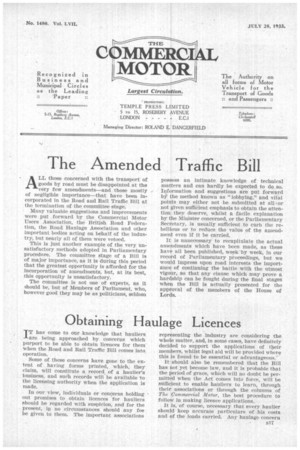The Amended Traffic Bill
Page 35

If you've noticed an error in this article please click here to report it so we can fix it.
ALL those concerned with the transport of goods by road must be disappointed at the very few amendments—and those mostly of nekligible importance—that have been incorporated in the Road and Rail Traffic Bill at the termination of the committee stage.
Many valuable suggestions and improvements were put forward by the Commercial Motor Users Association, the British Road Federation, the Road Haulage Association and other important bodies acting on behalf of the industry, but nearly all of them were vetoed.
This is just another example of the very unsatisfactory methods adopted in Parliamentary procedure. The committee stage of a Bill is of major importance, as it is during this period that the greatest opportunity is afforded for the incorporation of amendments, but, at its best, this opportunity is unsatisfactory.
The committee is not one of experts, as it should be, but of Members of Parliament, who, however good they may be as politicians, seldom possess an intimate knowledge of technical matters and can hardly be expected to do so. Information and suggestions are put forward 167 the method known as "lobbying," and vital points may either not be submitted at all or not given suffiCient emphasis to obtain the attention they deserve, whilst a facile explanation by the Minister concerned, or the Parliamentary Secretary, is usually sufficient to curb the rebellious or to reduce the value of the amendment even if it be carried.
It is unnecessary to recapitulate the actual amendments which have been made, as these have all been published, week by week, in our record of Parliamentary proceedings, but we would impress upon road interests the importance of continuing the battle with the utmost vigour, so that any clause which may prove a hardship can be fought during the final stages when the Bill is actually presented for the approval of the members of the House of Lords.




































































































